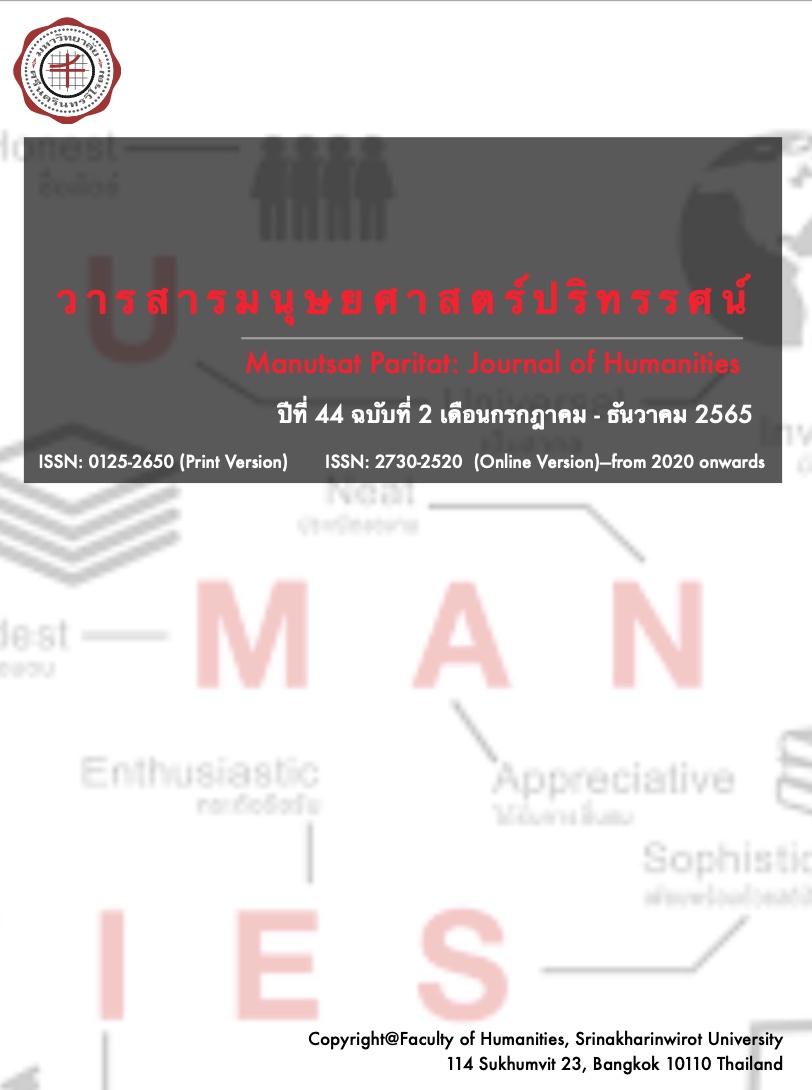Radical Enactivism and the Explanatory Gap
Main Article Content
Abstract
This article aims to critique the argument of radical enactivism in dealing with problem of ‘the explanatory gap’which is a controversial issue in philosophy of mind’s Physicalism. This problematic ‘gap’ is the gap between knowledge of physical facts and knowledge of phenomenal facts. Radical enactivism proposes a solution to this problem by arguing that, in fact, the physical facts of the interaction pattern between the cognitive system and the environment have the same identity as the physical facts. The author criticizes that the proposed argument is deficient. It is because the solution only addresses the explanatory gap in the qualitative aspect of the sensory experience. However, it cannot close the gap concerning the explanation of how an agent’s sensory experiences originated.
Article Details

This work is licensed under a Creative Commons Attribution-NonCommercial-NoDerivatives 4.0 International License.
Any unauthorized copying, publication, reproduction or distribution of copyrighted works appeared in Manutsat Paritat: Journal of Humanities is an infringement of the copyright owners’ rights. To authorize the copying, publication, reproduction or distribution of copyrighted works to be appeared in other printed materials or any online media, please write to MPJHthaijo@gmail.com for permission.
References
Campbell, N. (2004). A brief introduction to the philosophy of mind. Broadview Press.
Chalmers, D. (1996). The conscious mind: In search of a fundamental theory. Oxford University Press.
Chalmers, D. (2006). Phenomenal concepts and the explanatory gap. In T. Alter, W. Walter (Eds.) Phenomenal concepts and phenomenal knowledge: New essays on consciousness and physicalism (pp.167-194). Oxford University Press.
Chalmers, D. (2007). The hard problem of consciousness. In S. Schneider, M. Velmans (Eds.) The Blackwell companion to consciousness (pp. 32-42). John Wiley & Sons Ltd.
Chalmers, D. (2010). The character of consciousness. Oxford University Press.
Davidson, D. (1987). Knowing one’s own mind.Proceedings and Addresses of the American Philosophical Association, 60(3), 441–458.
Degenaar, J., & O'Regan, J. K. (2015). Sensorimotor theory of consciousness. Scholarpedia, 10(5), 4952.
Hutto, D. D. (2008). Folk Psychological Narratives: The Socio-Cultural Basis of Understanding Reasons. MIT Press.
Hutto, D. D. (2011). Philosophy of mind's new lease on life: Autopoietic enactivism meets teleosemiotics. Journal of Consciousness Studies, 18(5-6), 44–64.
Hutto, D. D. (2017). REC: Revolution effected by clarification. Topoi, 36(3), 377-391.
Hutto, D. D., & E. Myin. (2013). Radicalizing Enactivism: Basic Minds without Content. MIT Press.
Hutto, D. D., & E. Myin. (2017). Evolving Enactivism: Basic Minds Without Content. MIT Press.
Kirchhoff, M., & Hutto, D. D. (2016). Never mind the gap: Neurophenomenology, radical enactivism, and the hard problem of consciousness. Constructivist Foundations, 11(2), 346–353.
Kriegel, U. (2003). Naturalizing subjective character. Philosophy and Phenomenological Research, 71(1), 23-57.
Levine, J. (1983). Materialism and qualia: The explanatory gap. Pacific Philosophical Quarterly, 64(4), 354-361.
Levine, J. (2001). Purple haze. Oxford University Press.
McClelland, T. (2017). The problem of consciousness: Easy, hard or tricky? Topoi, 36(1), 17–30.
Nagel, T. (1974). What is it like to be a bat? Philosophical Review, 83(4), 435-450.
O’Regan, J. K., & Noë, A. (2001). A sensorimotor account of vision and visual consciousness. Behavioral and Brain Science, 24(5), 939-1031.
Place, U.T. (1956). Is consciousness a brain process?. British Journal of Psychology, 47(1), 44-50.
Rowlands, M. J. (2010). The new science of the mind: From extended mind to embodied phenomenology. MIT Press.
Shapiro, L., (2011). Embodied Cognition. Routledge.
Smart, J. J. C. (1959). Sensations and brain processes. Philosophical Review, 68(2), 141-156.
Thompson, E. (2004). Life and mind: From autopoiesis to neurophenomenology. A tribute to Francisco Varela. Phenomenology and the cognitive sciences, 3(4), 381-398.
Thompson, E. (2005). Sensorimotor subjectivity and the enactive approach to experience. Phenomenology and the cognitive sciences, 4(4), 407-427.
Thompson, E. (2007). Mind in life: Biology, phenomenology and the sciences of the mind. Harvard University Press.
Thompson, E., & Stapleton, M. (2009). Making sense of sense-making: Reflections on enactive and extended mind theories. Topoi 28(1), 23-30.
Varela, F. J., Thompson, E., & Rosch, E. (1991). The embodied mind: Cognitive science and human experience. MIT press.
Varela, F. J., Thompson, E., & Rosch, E. (2017). The embodied mind, revised edition: Cognitive science and human experience. MIT press.
Weber, A., & Varela, F. J. (2002). Life after Kant: Natural purposes and the autopoietic foundations of biological individuality. Phenomenology and the cognitive sciences, 1(2), 97-125.
Weisberg, J. (2012). Hard problem of consciousness. In J. Feiser & B. Dowden (Eds.), Internet encyclopedia of philosophy, ISSN 2161-0002, https://iep.utm.edu/hard-problem-of-conciousness/, [2020, July 15]


